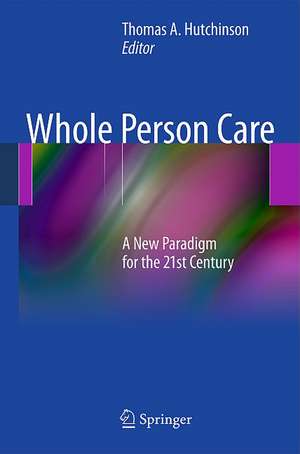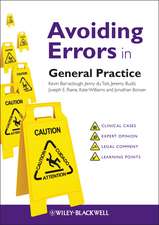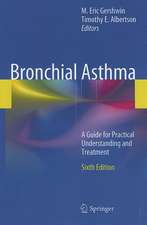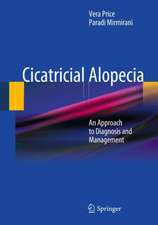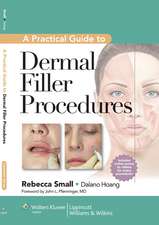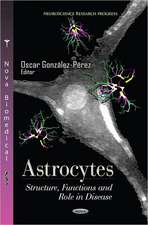Whole Person Care: A New Paradigm for the 21st Century
Editat de Tom A. Hutchinsonen Limba Engleză Hardback – 11 mai 2011
| Toate formatele și edițiile | Preț | Express |
|---|---|---|
| Paperback (2) | 450.75 lei 22-36 zile | |
| Springer International Publishing – 15 sep 2017 | 450.75 lei 22-36 zile | |
| Springer – 27 noi 2014 | 546.64 lei 43-57 zile | |
| Hardback (2) | 527.23 lei 38-44 zile | |
| Springer International Publishing – 19 dec 2017 | 527.23 lei 38-44 zile | |
| Springer – 11 mai 2011 | 770.72 lei 43-57 zile |
Preț: 770.72 lei
Preț vechi: 811.28 lei
-5% Nou
Puncte Express: 1156
Preț estimativ în valută:
147.54€ • 151.74$ • 122.40£
147.54€ • 151.74$ • 122.40£
Carte tipărită la comandă
Livrare economică 17 februarie-03 martie
Preluare comenzi: 021 569.72.76
Specificații
ISBN-13: 9781441994394
ISBN-10: 1441994394
Pagini: 278
Ilustrații: XXIV, 234 p.
Dimensiuni: 155 x 235 x 20 mm
Greutate: 0.54 kg
Ediția:2011
Editura: Springer
Colecția Springer
Locul publicării:New York, NY, United States
ISBN-10: 1441994394
Pagini: 278
Ilustrații: XXIV, 234 p.
Dimensiuni: 155 x 235 x 20 mm
Greutate: 0.54 kg
Ediția:2011
Editura: Springer
Colecția Springer
Locul publicării:New York, NY, United States
Public țintă
Professional/practitionerCuprins
Acknowledgments.- Preface.- Foreword.- Whole person care.- Suffering, whole person care, and the goals of medicine.- The healing journey.- The challenge of medical dichotomies and the congruent physician / patient relationship in medicine.- Separation-attachment theory in illness and the role of the healthcare practitioner.- Empathy, compassion and the goals of medicine.- Mindfulness and whole person care.- Healing, wounding, and the language of medicine.- Death anxiety: the challenge and the promise of whole person care.- Whole person self-care: self-care from the inside out.- Prevention and whole person care.- Whole person care and complementary and alternative therapies.- Spiritual dimensions of whole person care.- Whole person care and the revolution in genetics.- Whole person care on a busy medical ward.- Teaching whole person care in medical school.- Whole person care, professionalism, and the medical mandate.- Whole person care: Conclusions.- Appendix
Recenzii
From the reviews:
“The book is written by and for physicians (and medical students) and explores the existential challenges of the illness experience, the healing process and the nature of the clinical interaction. … This is a thought-provoking book. … this volume has provided many opportunities for reflection. I also found the extensive and up-to-date references very useful. I would recommend this book to those wanting to develop their own practice or to teach others.” (Ofra Fried, Royal Australasian College of Physicians, February, 2012)
“‘It is the internal resources of the individual persons who become patients that constitute the major untapped resource that the whole person care and medicine needs to harness effectively in the twenty-first century.’ … The audience is everyone who is in the practice of medicine … consumer of medical practice. … the book is a very easy read … . extremely worthwhile book to sensitize students to how medicine became what it is today, making it essential to every library associated with a teaching program.” (Vincent F. Carr, Doody's Book Reviews, August, 2011)
“The book is written by and for physicians (and medical students) and explores the existential challenges of the illness experience, the healing process and the nature of the clinical interaction. … This is a thought-provoking book. … this volume has provided many opportunities for reflection. I also found the extensive and up-to-date references very useful. I would recommend this book to those wanting to develop their own practice or to teach others.” (Ofra Fried, Royal Australasian College of Physicians, February, 2012)
“‘It is the internal resources of the individual persons who become patients that constitute the major untapped resource that the whole person care and medicine needs to harness effectively in the twenty-first century.’ … The audience is everyone who is in the practice of medicine … consumer of medical practice. … the book is a very easy read … . extremely worthwhile book to sensitize students to how medicine became what it is today, making it essential to every library associated with a teaching program.” (Vincent F. Carr, Doody's Book Reviews, August, 2011)
Textul de pe ultima copertă
A ground-breaking new volume and the first of its kind to concisely outline and explicate the emerging field of whole person care process, Whole Person Care: A New Paradigm for the 21st Century organizes the disparate strains of literature on the topic. It does so by clarifying the concept of 'whole person' and also by outlining the challenges and opportunities that death anxiety poses to the practice of whole person care. Whole person care seeks to study, understand and promote the role of health care in relieving suffering and promoting healing in acute and chronic illness as a complement to the disease focus of biomedicine. The focus is on the whole person -- physical, emotional, social, and spiritual. Using concise, easy-to-read language, the early chapters offer practitioners a thorough understanding of the concepts, skills and tools necessary for the practice of whole person care from a clinician-patient interaction standpoint, while the last two chapters review the myriad implications of whole person care for medical practice. An invaluable resource for all areas of medical practice and for practitioners at all stages of development, from medical students to physicians and allied health providers with many years of experience, Whole Person Care: A New Paradigm for the 21st Century will have a profound impact on western medical practice in North America and elsewhere.
Caracteristici
Targeted review of theoretical and clinical foundations of whole person care Offers practitioners a comprehensive understanding of the concepts, skills and tools necessary for the practice of whole person care Relevant to all areas of medical practice and to practitioners at all stages of development
Notă biografică
Dr. Tom Hutchinson graduated in Medicine from the National University of Ireland with honours in 1971. He trained as an Internist and Nephrologist at McGill University from 1972-1976. From 1976 to 1978 he was a Robert Wood Johnson Clinical Scholar at Yale University with Dr. Alvan Feinstein. Dr. Feinstein led a revolution in medical research that included patients’ subjective experience and reported symptoms as a source of research data. In 1978 Dr. Hutchinson returned to McGill where he combined clinical practice of Nephrology and Internal Medicine with research on the clinical determinants of survival in patients with kidney failure. Concern for the lived experience of patients with kidney and other chronic diseases, as well as for their caregivers, led Dr. Hutchinson to meet pioneering therapist Virginia Satir in 1986, to complete a 4 year training course in Family Therapy at the McGill Institute for Community Psychiatry in 1995 and to publish a book on the stories of kidneypatients in 1998.
In 2002, in order to enlarge his focus on the quality of patients’ lived experience, Dr. Hutchinson changed his clinical practice to Palliative Medicine and joined Dr. Balfour Mount in developing McGill Programs in Whole Person Care. The Programs are aimed at enlarging the Western Health Care mandate from cure and prolongation of life to an equal concern with patients’ quality of life. The Programs seek to study, understand and promote the role of health care in relieving suffering and promoting healing in acute and chronic illness as a complement to the disease focus of biomedicine. Since 2005, the Programs have taught healing in medicine to all medical students throughout all 4 years of the new Physicianship Curriculum at McGill. Dr. Hutchinson edited the first academic book on Whole Person Care that was published by Springer in 2011, “Whole Person Care: A New Paradigm for the 21st Century”. In 2012, he was named to the Faculty Honour List for Teaching Excellence at McGill in recognition of “outstanding contributions to education in the Faculty of Medicine”. Dr. Hutchinson chaired the First International Congress on Whole Person Care, sponsored by McGill's Faculty of medicine, October 2013.
In 2002, in order to enlarge his focus on the quality of patients’ lived experience, Dr. Hutchinson changed his clinical practice to Palliative Medicine and joined Dr. Balfour Mount in developing McGill Programs in Whole Person Care. The Programs are aimed at enlarging the Western Health Care mandate from cure and prolongation of life to an equal concern with patients’ quality of life. The Programs seek to study, understand and promote the role of health care in relieving suffering and promoting healing in acute and chronic illness as a complement to the disease focus of biomedicine. Since 2005, the Programs have taught healing in medicine to all medical students throughout all 4 years of the new Physicianship Curriculum at McGill. Dr. Hutchinson edited the first academic book on Whole Person Care that was published by Springer in 2011, “Whole Person Care: A New Paradigm for the 21st Century”. In 2012, he was named to the Faculty Honour List for Teaching Excellence at McGill in recognition of “outstanding contributions to education in the Faculty of Medicine”. Dr. Hutchinson chaired the First International Congress on Whole Person Care, sponsored by McGill's Faculty of medicine, October 2013.
